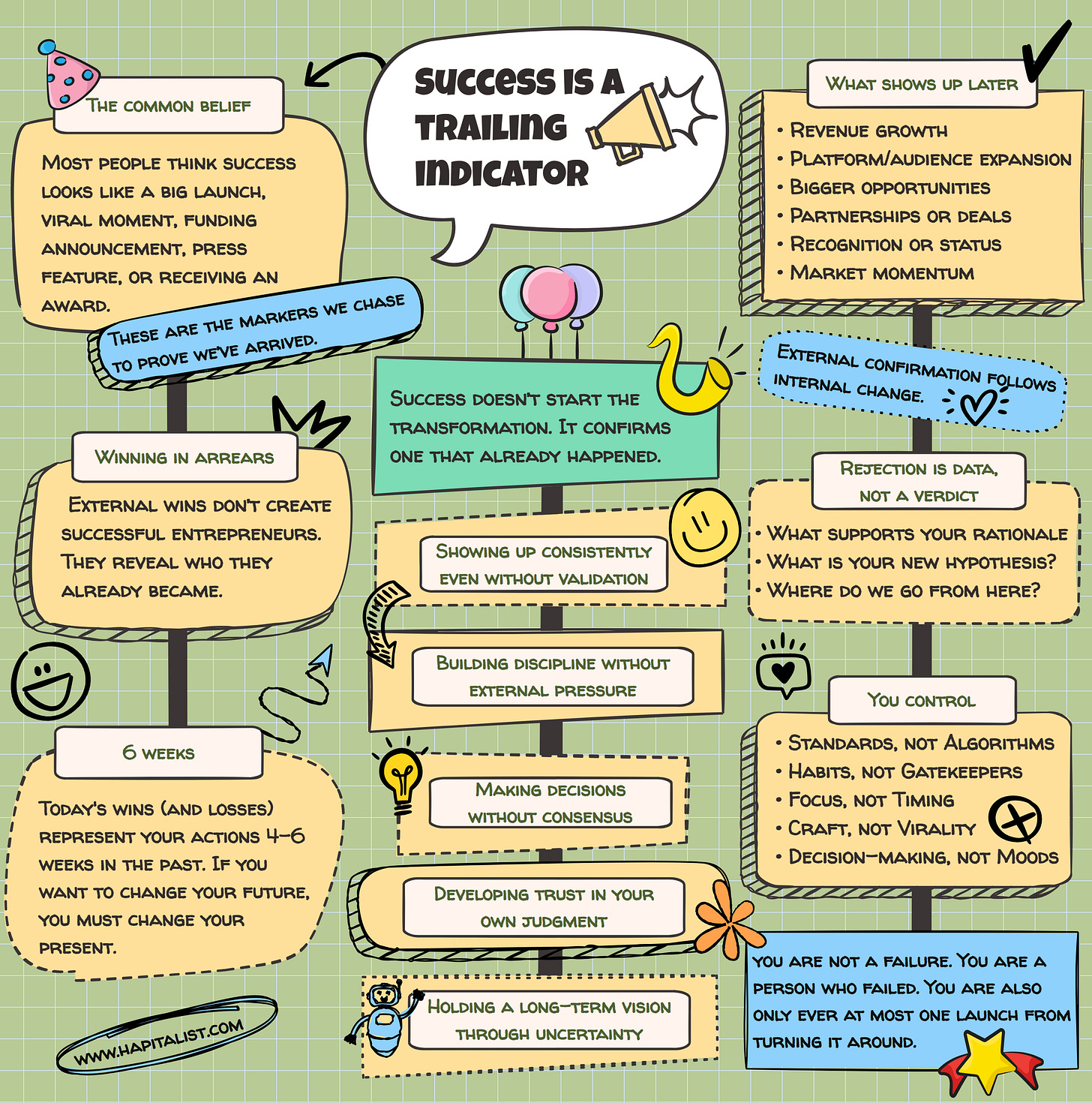Success is a trailing indicator...
Most entrepreneurs think success is proof they’ve made it, but what if it’s actually evidence of who they’ve already become?
Hi,
Most entrepreneurs believe success is a leading indicator that shows they’ve arrived.
Whether that’s the huge launch, getting a big award, being offered the speaking invitation, or the profile in a magazine
These are the markers we chase, the evidence we’ve crossed some invisible threshold into “made it” territory.
We watch for them like sailors scanning the horizon for land.
It’s really the inverse, though. What I’ve learned working with highly successful entrepreneurs for over a decade is that success is actually a trailing indicator.
It’s not the beginning of something. It’s the evidence of something that already happened internally, often months or years before the external world caught up. Honestly, it’s true, but it’s also something that only really makes sense after you see it play out as many times as we have, with a diverse case of success stories.
Think about the author who lands a six-figure deal. By the time that contract appears, something fundamental has already shifted.
They’ve already developed the discipline to show up at the page.
They’ve already pushed through dozens of failed drafts.
They’ve already cultivated the ability to hold a vision while everyone around them sees nothing.
The deal doesn’t create the entrepreneur, it reveals them.
What about the novelist whose third book finally breaks out? Their success isn’t what changed them.
This pattern repeats itself across every success story I’ve witnessed. In every case, the external recognition was a lagging confirmation of an internal transformation that had already taken place.
Before the external markers arrive, something internal solidifies. A shift happens in how you see yourself and your work.
You stop waiting for permission and develop internal authority, the quiet certainty that what you’re doing matters, regardless of who’s paying attention.
This shift isn’t dramatic. There’s no lightning bolt moment. Most can’t even pinpoint when it happened. They just notice one day that they’re approaching their work differently.
This is the actual leading indicator. This is what precedes everything else.
I’ve seen this shift take different forms. You stop asking “Is this good enough?” and start asking “Is this true?” You stop waiting for the industry to validate your existence and start validating your own choices.
This internal authority isn’t arrogance and it’s not the belief that everything you do is brilliant, but quieter and more durable realization that you know what you’re doing and can trust yourself.
When you understand that success is a trailing indicator, everything changes.
You recognize that the transformation has to happen first, and that it’s entirely within your control, and start focusing on the things that actually create sustainable success: showing up consistently, developing your craft, building your capacity to handle uncertainty, learning to trust your own judgment.
These aren’t sexy, and won’t make good Instagram posts, but they’re what successful people do in the years before anyone’s watching. Your current lack of recognition isn’t evidence of your lack of talent, but simply evidence that the trailing indicators haven’t caught up yet.
When somebody declines working with you, they’re not rejecting your potential. They’re making a business decision based on current market conditions, their existing list, their editorial capacity, and a dozen other factors that have nothing to do with whether you’re becoming the person you need to become.
The rejection is data, not verdict.
It changes how you relate to other’s success, too. When a colleague lands the deal you wanted, you can recognize that their external success is trailing behind internal work you didn’t witness. Their trajectory says nothing about yours. Your leading indicators are just operating on their own timeline.
There’s something deeply freeing about recognizing that success trails behind internal change rather than leading to it.
It means you don’t have to wait. You don’t need anyone’s permission to become who you want to be. You don’t need success to start acting like a professional. You don’t need the audience to start respecting your own time and work.
You can make this internal shift today.
You can decide that your work matters. You can commit to the craft. You can build the habits that will sustain you through the long middle of a career.
And then, months or years from now, the trailing indicators will arrive. The opportunities will appear. The recognition will come, not because they created something new in you, but because they finally caught up with what you’d already become.
It means you can stop refreshing your email for agent responses and use that time to study. It means you can stop comparing your product to others and instead focus on what you’re learning from this project. It means you can stop trying to reverse-engineer the market and start building a body of work only you can create.
The entrepreneur who understands this distinction operates differently in the world.
They are less fragile because their identity isn’t hostage to external validation. They’re more consistent because they’re not waiting for motivation from outside sources. They’re more original because they’re listening to the work rather than to the marketplace’s echo chamber.
They’re also, paradoxically, more likely to achieve the traditional markers of success because the habits and mindsets that create internal authority are precisely the qualities that eventually produce great products.
The success will come. It’s a trailing indicator, remember? It will eventually catch up to the person you’re becoming.
But the becoming? That’s the only part you can control.
And it’s also the only part that matters.
Stop chasing the markers. Stop waiting for external validation to tell you you’re ready.
The external validation will arrive or it won’t. But you’ll be an entrepreneur either way. You’ll have done the work that matters. You’ll have built something real.
And when the trailing indicators finally catch up you won’t need them to tell you who you are.
You’ll already know.


